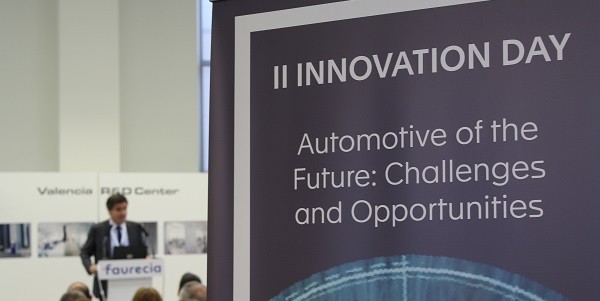Disruptive technologies drive us towards the car of the future

The automotive sector is currently going through a process of change by tapping into the opportunities offered by disruptive technologies such as collaborative robotics, Big Data and virtual reality, without forgetting the cybersecurity threats that now need to be dealt with. These new production processes mean we can now speak of the “car of the future” as a present-day concept.
Mindful of the digital transformation, Faurecia, a global player in the automotive component industry, has put on in its R&D center the conference called “Innovation Day: Automotive Interiors of the Future: Challenges and Opportunities”. In this technical conference the automotive firm talked us through the challenges that have cropped up in the last 2 years and how they have been dealt with, inviting suggestions and conclusions from the floor. The event attracted Valencia Region’s main industry and automobile firms that can also boast an innovative culture. GMV fits in perfectly here; innovation is hard-wired into its thinking and it is nowadays a beacon in both sectors.
Carlos Sahuquillo, Cybersecurity Consultant of GMV’s Secure e-Solutions sector, took part in the debating panel on Big Data and RFID (Radio Frequency Identification), inputting a different solution using Blockchain to solve a goods-dispatch problem.
Throughout the day the conference looked at how the technological revolution is impinging on automobile component manufacturers and also how necessary it is to be ready for these great changes looming up. Among other cases the conference analyzed which will be the new functions of vehicle interiors deriving from the replacement of the internal combustion engine or the autonomous vehicle, as well as debating the advantages of creating synergies between people and firms to generate game-changing ideas born from interaction.
“For years now Faurecia has been applying the Lean Manufacturing methodology in its plants. One of the most surprising things you see on a visit to its site is that they have maintained faithful to the Lean model despite having automated and modernized plant systems with technology as disruptive as Big Data to head off machine breakdowns and carry out predictive maintenance” said Carlos Sahuquillo about his experience in the automotive firm’s site.
The automobile sector is advancing towards digitalization at a good lick: electric car, connected car, self-driving, etc. It has by now been made clear that innovation is vital; we now need to pull certain levers that will pitch industry into a totally digitalized environment, with a client-centered approach. Various studies show that automobile manufacturers expect 24% of their plants to be intelligent by late 2022. Sector productivity, moreover, is expected to rise by an average of 7% by 2023; from then on the automobile industry will earn 160 billion dollars a year as a result of Industry 4.0-driven production improvements.